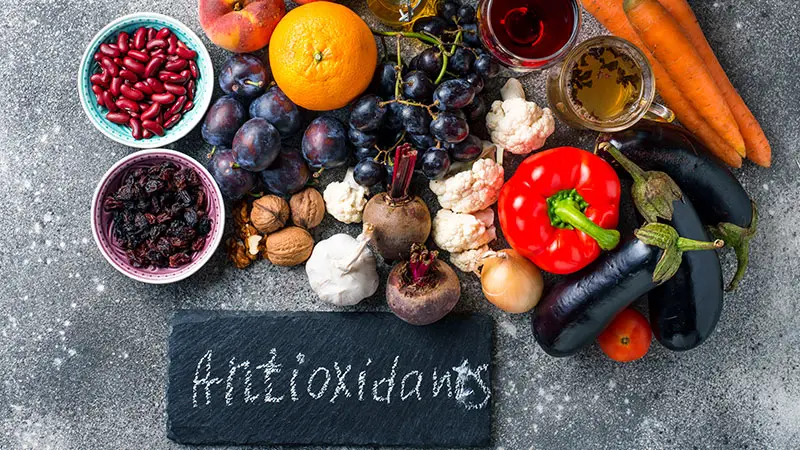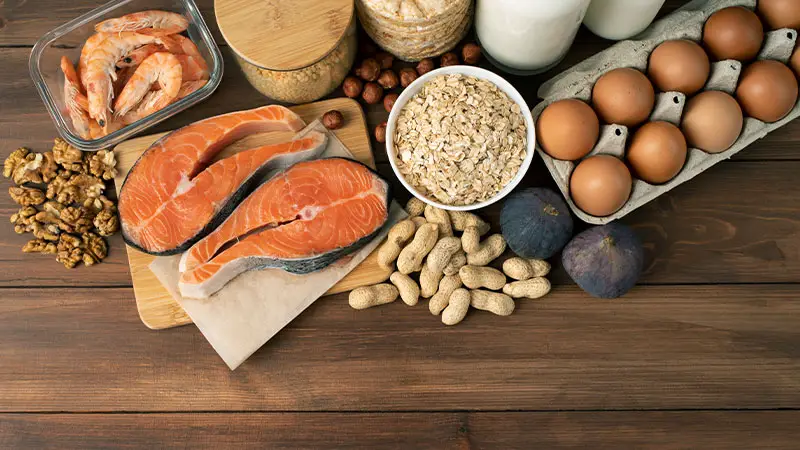Ever wondered how a single compound could benefit your heart, energy levels, and overall health? Enter Coenzyme Q10 (CoQ10).
This naturally occurring substance is not just a mere player but a powerhouse in the realm of health supplements. CoQ10, also known as ubiquinone, is pivotal for cellular energy production and serves as a potent antioxidant in the body.
Its benefits extend beyond energy metabolism; CoQ10 supports cardiovascular health, boosts energy levels, and protects cells from oxidative damage. Moreover, it plays a crucial role in brain health, muscle function, and even fertility.
As we delve into the diverse health benefits of CoQ10, it becomes evident why this compound has garnered significant attention in the realm of nutrition and wellness.
Let’s explore how CoQ10 can enhance your vitality and well-being across multiple facets of health. So, stay focused.

What is Coenzyme Q10?
Coenzyme Q10 (CoQ10), also known as ubiquinone, is a vital compound found naturally in the body and plays a crucial role in cellular energy production.
It exists in every cell and is particularly concentrated in organs with high energy requirements such as the heart, liver, and kidneys.
CoQ10 functions as an electron carrier in the mitochondrial respiratory chain, facilitating the production of adenosine triphosphate (ATP), the body’s primary energy currency.
Beyond its role in energy metabolism, CoQ10 also serves as a potent antioxidant, protecting cells from oxidative damage caused by free radicals and reactive oxygen species.
As individuals age or face certain health conditions, CoQ10 levels may decrease, potentially affecting cellular energy production and antioxidant capacity.
Therefore, supplementation with CoQ10 is often considered to support cardiovascular health, improve energy levels, and enhance antioxidant defenses.
Although naturally produced by the body and obtainable through dietary sources like oily fish and organ meats, CoQ10 supplements are popular for individuals looking to maintain overall health and vitality, especially as they age.
10 Health Benefits of Coenzyme Q10
Coenzyme Q10 (CoQ10), also known as ubiquinone, is a vital compound naturally produced in the body and found in certain foods. It plays a crucial role in cellular energy production and serves as a potent antioxidant.
CoQ10 is involved in the mitochondrial respiratory chain, facilitating ATP production, which is essential for energy metabolism.
Additionally, it helps protect cells from oxidative damage caused by free radicals and supports overall cellular health. Health Benefits of Coenzyme Q10:
1. Supports Cardiovascular Health

CoQ10 is crucial for heart health due to its role in energy production within cardiac cells. The heart requires significant energy to function optimally, and CoQ10 helps in the production of ATP, the primary energy molecule in cells.
Additionally, CoQ10 acts as an antioxidant, protecting LDL cholesterol from oxidation and supporting endothelial function, which is vital for healthy blood vessels.
Studies suggest that CoQ10 supplementation may benefit individuals with heart conditions, helping to improve symptoms like chest pain, heart failure, and hypertension.
2. Boosts Energy Levels

CoQ10 plays a key role in the production of ATP, which is essential for cellular energy. ATP provides the energy needed for muscle contractions, maintenance of body temperature, and overall physical activity.
As we age or face certain health conditions, CoQ10 levels may decline, leading to reduced energy levels and fatigue.
Supplementing with CoQ10 can help support cellular energy production, potentially enhancing overall energy levels and reducing feelings of fatigue.
3. Acts as an Antioxidant

CoQ10 functions as a powerful antioxidant in the body, neutralizing free radicals and reducing oxidative stress. Free radicals are unstable molecules that can damage cells and contribute to aging and various diseases.
By scavenging these free radicals, CoQ10 helps protect cells from oxidative damage and supports overall cellular health.
It also works synergistically with other antioxidants like vitamin E and vitamin C, enhancing their effectiveness in combating oxidative stress.
This antioxidant property of CoQ10 is particularly beneficial for cardiovascular health, skin health, and overall aging processes.
4. Supports Brain Health

CoQ10 plays a vital role in maintaining brain health and cognitive function. It is involved in the production of ATP, which is essential for nerve transmission and brain cell communication.
Additionally, CoQ10’s antioxidant properties help protect brain cells from oxidative damage and inflammation, which are implicated in neurodegenerative diseases such as Alzheimer’s and Parkinson’s disease.
Studies have shown that CoQ10 supplementation may improve cognitive function, memory, and overall brain health, particularly in older adults or those at risk of neurodegenerative disorders.
5. Reduces Migraine Frequency

CoQ10 supplementation has shown promise in reducing the frequency and severity of migraines. Migraines are often associated with mitochondrial dysfunction and oxidative stress in the brain.
CoQ10 supports mitochondrial function and acts as an antioxidant, helping to reduce oxidative stress and inflammation that may contribute to migraine attacks.
Several clinical trials have demonstrated that CoQ10 supplementation can significantly decrease the frequency of migraines in individuals suffering from chronic migraines.
It is believed that CoQ10’s ability to improve mitochondrial energy production and reduce oxidative stress in the brain contributes to its beneficial effects on migraine prevention.
6. Supports Muscle Health

Muscle cells require a significant amount of energy for optimal function and performance, especially during exercise and physical activity.
CoQ10 plays a crucial role in energy production within muscle cells by aiding in the production of ATP, the primary energy molecule.
Supplementing with CoQ10 has been shown to improve exercise performance, reduce exercise-induced fatigue, and support muscle recovery after strenuous exercise.
Additionally, CoQ10’s antioxidant properties help protect muscle cells from oxidative damage and inflammation, which can occur during intense physical activity.
Athletes and individuals engaged in regular exercise may benefit from CoQ10 supplementation to enhance muscle health, improve endurance, and support overall physical performance.
7. Supports Skin Health

CoQ10 is beneficial for skin health due to its antioxidant properties and role in cellular energy production.
As an antioxidant, CoQ10 helps neutralize free radicals that contribute to skin aging and damage, such as wrinkles, fine lines, and age spots.
By reducing oxidative stress, CoQ10 supports skin cell function and promotes collagen production, which is essential for maintaining skin elasticity and firmness.
Studies have shown that topical application of CoQ10 can help reduce oxidative damage to the skin caused by UV radiation and improve skin hydration and smoothness.
Additionally, oral supplementation of CoQ10 may enhance skin repair processes and protect against premature aging.
Incorporating CoQ10 into skincare routines or through supplementation may help promote healthy, youthful-looking skin and protect against environmental damage.
8. Supports Fertility

CoQ10 plays a crucial role in reproductive health and fertility. It is involved in energy production within cells, including those in the reproductive system. CoQ10 levels decline with age, which can affect both male and female fertility.
In women, CoQ10 supports egg quality and mitochondrial function in ovarian cells, which are essential for healthy fertility and reproductive outcomes.
Studies have shown that CoQ10 supplementation may improve egg quality and increase the chances of successful conception, particularly in older women undergoing fertility treatments.
In men, CoQ10 supports sperm health by protecting sperm cells from oxidative damage and improving sperm motility.
Supplementing with CoQ10 may help support overall reproductive health and improve fertility outcomes in both men and women.
9. Supports Diabetes Management

CoQ10 may play a beneficial role in managing diabetes by improving insulin sensitivity and glucose metabolism. Insulin resistance, a hallmark of type 2 diabetes, is associated with mitochondrial dysfunction and oxidative stress.
CoQ10 supports mitochondrial function and acts as an antioxidant, helping to improve cellular energy production and reduce oxidative damage in cells affected by insulin resistance.
Studies have shown that CoQ10 supplementation can improve glycemic control, reduce markers of oxidative stress, and enhance antioxidant defenses in individuals with type 2 diabetes.
Additionally, CoQ10 may help reduce complications associated with diabetes, such as diabetic neuropathy and cardiovascular complications, by supporting overall mitochondrial and cellular health.
10. Supports Immune Function

CoQ10 plays a role in supporting immune function by enhancing cellular energy production and modulating immune cell activity.
Immune cells, such as lymphocytes and macrophages, require a significant amount of energy to function effectively in responding to infections and maintaining immune surveillance.
CoQ10 helps in the production of ATP, which is essential for immune cell proliferation, differentiation, and activity.
Additionally, CoQ10’s antioxidant properties help protect immune cells from oxidative damage caused by free radicals generated during immune responses.
Studies have suggested that CoQ10 supplementation may enhance immune function, particularly in older adults or individuals with compromised immune systems.
By supporting cellular energy production and antioxidant defenses, CoQ10 contributes to overall immune health and resilience against infections and diseases.
Coenzyme Q10 (CoQ10) is a versatile compound that plays a critical role in energy production and antioxidant defense within the body.
Its benefits extend to supporting cardiovascular health, boosting energy levels, acting as an antioxidant, supporting brain health, supporting muscle health, promoting skin health, supporting fertility, and enhancing immune function.
Whether obtained through dietary sources or supplementation, CoQ10 offers numerous health benefits, making it a valuable nutrient for overall health and well-being.
Food Sources of Coenzyme Q10

Coenzyme Q10 (CoQ10), also known as ubiquinone, is a naturally occurring compound found in various foods. It plays a crucial role in cellular energy production and acts as a potent antioxidant in the body.
While the body can synthesize CoQ10 endogenously, dietary sources can contribute significantly to overall CoQ10 levels, especially in individuals who may benefit from supplementation due to age or health conditions.
Meat and Fish
Animal-based foods are among the richest sources of CoQ10. Particularly, organ meats such as liver, heart, and kidney contain high concentrations of CoQ10.
For example, beef heart and pork heart are known to have substantial amounts of CoQ10. Among fish, sardines, mackerel, and salmon are notable sources.
These foods not only provide CoQ10 but also offer essential nutrients like proteins, vitamins (e.g., B vitamins), and minerals (e.g., iron and zinc) that support overall health.
Poultry
Chicken and turkey are also good sources of CoQ10, especially if consumed with the skin.
Dark meat tends to contain slightly higher levels of CoQ10 compared to white meat. Regular consumption of poultry can contribute to CoQ10 intake as part of a balanced diet.
Oils and Nuts
Certain oils and nuts provide CoQ10 in smaller amounts. Soybean and canola oils contain moderate levels of CoQ10.
Nuts such as peanuts and pistachios also contain some CoQ10, although the amounts are relatively lower compared to meats and fish.
Incorporating these oils and nuts into your diet can complement CoQ10 intake alongside their healthy fats and other beneficial nutrients.
Fruits and Vegetables
While fruits and vegetables generally contain lower levels of CoQ10 compared to animal-based foods, some varieties still contribute to overall intake.
Spinach, broccoli, cauliflower, and oranges are examples of fruits and vegetables that contain CoQ10, although in smaller quantities.
These foods are valuable for their fiber, vitamins, and antioxidants, which support overall health and well-being.
Legumes and Whole Grains
Legumes and whole grains provide essential nutrients and dietary fiber, but they are not significant sources of CoQ10.
However, including foods like lentils, chickpeas, and whole grains such as oats and barley in your diet provides a range of health benefits and can contribute to overall nutrient intake, including CoQ10 from various sources.
Dairy Products
Dairy products such as milk, cheese, and yogurt contain CoQ10, although the levels are relatively low compared to other food sources.
These foods are important for their calcium, protein, and probiotic content, which contribute to bone health and gut health. Incorporating dairy products into your diet can provide additional CoQ10 along with these essential nutrients.
Fortified Foods
Some food products are fortified with CoQ10 to enhance their nutritional value. These may include certain beverages, cereals, and nutritional supplements.
Fortification ensures a consistent intake of CoQ10 for individuals looking to increase their levels through specific dietary choices or supplementation.
Coenzyme Q10 is essential for cellular energy production and antioxidant defense in the body.
While dietary intake alone may not meet the therapeutic levels required for specific health conditions, incorporating CoQ10-rich foods into a balanced diet can support overall health and well-being.
For individuals with specific health concerns or those at risk of CoQ10 deficiency, supplementation under medical guidance may be necessary to achieve optimal levels.
Wrapping Up
Coenzyme Q10 (CoQ10) emerges as a versatile compound with multifaceted health benefits.
From supporting cardiovascular health and boosting energy levels to acting as a potent antioxidant and promoting brain function, CoQ10 plays a crucial role in overall well-being.
Its ability to reduce migraine frequency, support muscle health, enhance skin vitality, and aid in fertility and diabetes management underscores its importance in maintaining optimal health across various life stages.
Whether obtained through dietary sources or supplementation, CoQ10 offers a valuable means to bolster cellular energy production and protect against oxidative stress, thereby supporting longevity and vitality.
Incorporating CoQ10-rich foods into a balanced diet, alongside considering supplementation when necessary, can help harness its full potential in promoting a healthier, more resilient body and mind. Best wishes.
